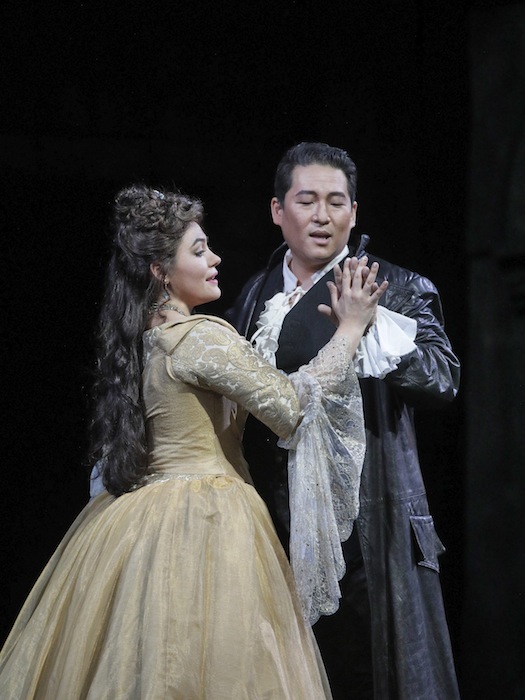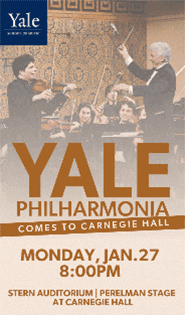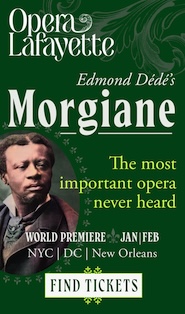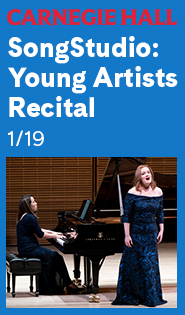Tenor trois more than good enough for Gounod in Met’s “Romeo et Juliette”

Ailyn Pérez and Andrea Shin starred in Gounod’s “Romeo et Juliette” Monday night at the Metropolitan Opera. Photo: Ken Howard
Sumptuous is the word for the Metropolitan Opera’s revival of Roméo et Juliette. This Bartlett Sher production first ran in the 2016-17 season, and its sheer handsomeness is a fine complement to the riches in Gounod’s score.
All this came together at Monday night’s opener through generally excellent music making, predominantly the singing of the leads, soprano Ailyn Pérez as Juliette and tenor Andrea Shin as Roméo.
Andrea who? In something close to scheduling tragicomedy, the original Roméo, Brian Hymel, fell ill. The Met replaced him with Charles Castronovo, who then also fell ill opening day. So in came Shin, who had been understudy to both (Castronovo is still scheduled to sing in the remaining performances).
This was, it goes without saying, Shin’s stage debut at the Met. This wasn’t the clichéd story of an unknown singer becoming a star. Rather, it was something more prosaic, and impressive because of that.
Shin has a strong romantic tenor with an ideal sound for this kind of 19th century role—warm, full, and smooth in his upper register. He sang with a sort of modesty, truly passionate but completely unmannered, with not a hint of a self-indulgent vocal gesture. He carried a touching sense of devotion to the character. His sound was atttractive from the very start and he gained strength and resonance as the opera went on. In Act IV after intermission, he was appreciably more open and had a stronger projection to his voice.
What he didn’t have, inevitably, was the same level of artistry to match Pérez (and few have the extra bit of verve that is in her voice). His phrasing was always correct and fervent, albeit in a pleasingly square way. In a way, this made his singing of “O ma femme!” in the tomb magnificent—it’s measured seriousness brought the deepest power out of the music.
Meantime, Pérez was constantly shaping phrases and shading her sound, using small bits of rubato and modulations of dynamics for added expression. There was a touch of dialogue in her articulation, which added to the sense of drama she projected, as in the high-flying passage in “Ecoutez! Ecoutez!” In Act I, she had a slight harsh edge, but that was nowhere apparent in “Non! Non! Je ne veaux pas t’ecouter” later in the same act; this was mellifluous and shining, bright vocalism. The vocal contrast between Shin and Pérez in “De grâce, demeurez,” serendipitously reflected the social gap the two characters had to bridge.
This dividing line between what was essentially stiffness in rhythm and phrasing and, on the other side, malleable expression, ran through not just the two title lovers, but the entire cast.
The fine, reliable bass Kwangchul Yuon sang with easy gravity and perfect pace as Frère Laurent, while baritone Bradley Gavin was an inflexible Count Paris, which worked for the character. But bass Laurent Naouri went in and out as Capulet, everything about his singing seemed a little too slow, his articulation always behind the beat. This worked in moments, bringing out a bit of the clown in the Act I crowd scene, but mitigating what should have been high and conflicted emotions after Tybalt’s death.
Tybalt (tenor Bogdan Volkov in his schedule Met debut), and the other brawling clansmen—Mercutio (baritone Joshua Hopkins), Stephano (mezzo-soprano Karine Deshayes), and Benvolio (tenor Tony Stevenson)—sang well and with a sense of life and freedom that matched their stage activity, which included some decent sword fighting.
The chorus has a big part in this opera, and the Met ensemble was excellent, as usual. The enhances their importance, making them a changeable crowd that carried the mood of the big scenes, whether Carnivale or battle. That they looked splendid in Catherine Zuber’s costumes—Renaissance but with Victorian and modern touches—added to the immersive feeling of this production.
Set in front of the set’s gray stone architecture, the costumes for chorus and principals were characters in themselves. Juliette’s white gown and Roméo’s black leather jacket, pants, and boots might have seemed an obvious contrast, but they worked as kind of a yin and yang symbol, the two balanced in their own worlds between the warring sides.
This is a meaty score and conductor Plácido Domingo and the orchestra dug into it from the start. Domingo is still mastering his conducting craft, and there were some technical and conceptual flaws. The fugue in the overture was sloppy and triple-meter rhythms could have used a little more spring throughout. At the close of Act III, he seemed not able to decide whether to build up the music or drive through it.
But like the singing, the flaws highlighted how sound the overall performance was, full of atmosphere and feeling, supporting and expanding all the key dramatic moments. The Entr’acte for Act II was lovely, and the entirety of Acts IV and V played with cohesion and energy.
Roméo et Juliette continues through May 12. metopera.org; 212-362-2000.



Posted Apr 25, 2018 at 5:22 am by Michael Hano
As a last minute replacement, making his Met debut, having to sing alongside someone as great as Ailyn Perez, I thought Andrea Shin was fantastic. Really really great. They should just let him finish out the remaining performances. I hope he returns next season.